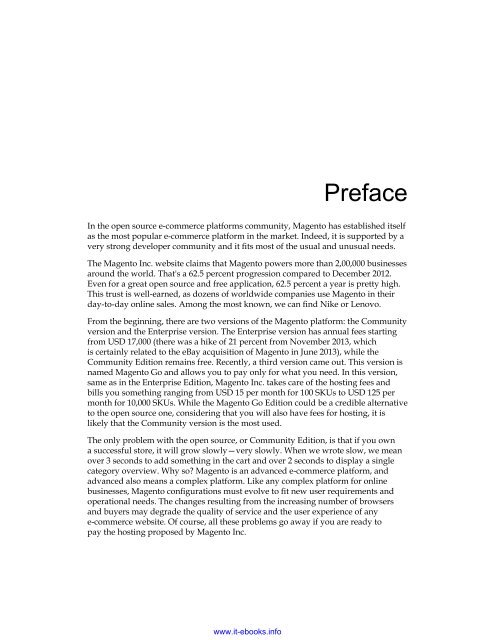Magento Site Performance Optimization
Create successful ePaper yourself
Turn your PDF publications into a flip-book with our unique Google optimized e-Paper software.
Preface<br />
In the open source e-commerce platforms community, <strong>Magento</strong> has established itself<br />
as the most popular e-commerce platform in the market. Indeed, it is supported by a<br />
very strong developer community and it fits most of the usual and unusual needs.<br />
The <strong>Magento</strong> Inc. website claims that <strong>Magento</strong> powers more than 2,00,000 businesses<br />
around the world. That's a 62.5 percent progression compared to December 2012.<br />
Even for a great open source and free application, 62.5 percent a year is pretty high.<br />
This trust is well-earned, as dozens of worldwide companies use <strong>Magento</strong> in their<br />
day-to-day online sales. Among the most known, we can find Nike or Lenovo.<br />
From the beginning, there are two versions of the <strong>Magento</strong> platform: the Community<br />
version and the Enterprise version. The Enterprise version has annual fees starting<br />
from USD 17,000 (there was a hike of 21 percent from November 2013, which<br />
is certainly related to the eBay acquisition of <strong>Magento</strong> in June 2013), while the<br />
Community Edition remains free. Recently, a third version came out. This version is<br />
named <strong>Magento</strong> Go and allows you to pay only for what you need. In this version,<br />
same as in the Enterprise Edition, <strong>Magento</strong> Inc. takes care of the hosting fees and<br />
bills you something ranging from USD 15 per month for 100 SKUs to USD 125 per<br />
month for 10,000 SKUs. While the <strong>Magento</strong> Go Edition could be a credible alternative<br />
to the open source one, considering that you will also have fees for hosting, it is<br />
likely that the Community version is the most used.<br />
The only problem with the open source, or Community Edition, is that if you own<br />
a successful store, it will grow slowly—very slowly. When we wrote slow, we mean<br />
over 3 seconds to add something in the cart and over 2 seconds to display a single<br />
category overview. Why so? <strong>Magento</strong> is an advanced e-commerce platform, and<br />
advanced also means a complex platform. Like any complex platform for online<br />
businesses, <strong>Magento</strong> configurations must evolve to fit new user requirements and<br />
operational needs. The changes resulting from the increasing number of browsers<br />
and buyers may degrade the quality of service and the user experience of any<br />
e-commerce website. Of course, all these problems go away if you are ready to<br />
pay the hosting proposed by <strong>Magento</strong> Inc.<br />
www.it-ebooks.info


